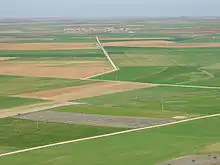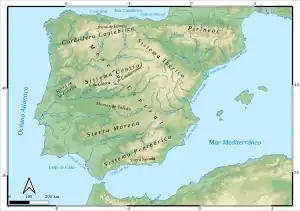
The Meseta Central (lit. 'central tableland', sometimes referred to in English as Inner Plateau) is one of the basic geographical units of the Iberian Peninsula. It consists of a plateau covering a large part of the latter's interior.
Developed during the 19th century, the concept of meseta central was handled by Heinrich Moritz Willkomm in lower case, and eventually Salvador Calderón y Arana was reportedly the first in using it in upper case, giving it a toponymic nature.[1] The concept was also brought forward by José Macpherson y Hemas,[2] while the writers of the Spanish Generation of '98 greatly contributed to its popularisation among the public sphere.[3]

The Sistema Central mountain range cuts across the Meseta Central, leaving the Submeseta Norte sub-unit (with heights mostly ranging from 700 to 800 m) to the North and the Submeseta Sur (with heights mostly ranging from 600 to 700 m) to the South.[4] Respectively, the former is drained by the Douro while the latter is drained by the Tagus and the Guadiana.[4] The meseta is flanked by relief units such as the Montes de León, the Galician Massif, the Cantabrian Range, the Basque Mountains, the Sistema Ibérico and Sierra Morena.[4]
References
- Citations
- ↑ Casals Costa 2001, p. 17.
- ↑ Casals Costa 2001, pp. 8–9.
- ↑ Casals Costa 2001, p. 18.
- 1 2 3 "El Relieve". Instituto Geográfico Nacional.
- Bibliography
- Casals Costa, Vicenç (2001). "Ciencia, política y territorio. La construcción del paradigma regional en la Península Ibérica" (PDF). Scripta Nova. Barcelona: Universitat de Barcelona (79): 17. ISSN 1138-9788.